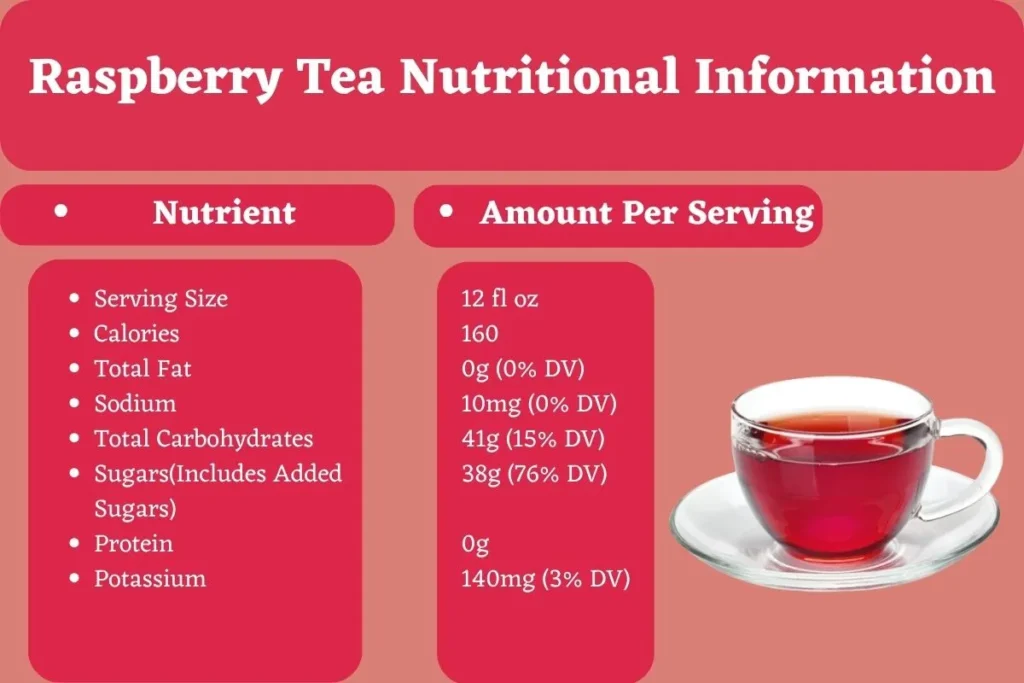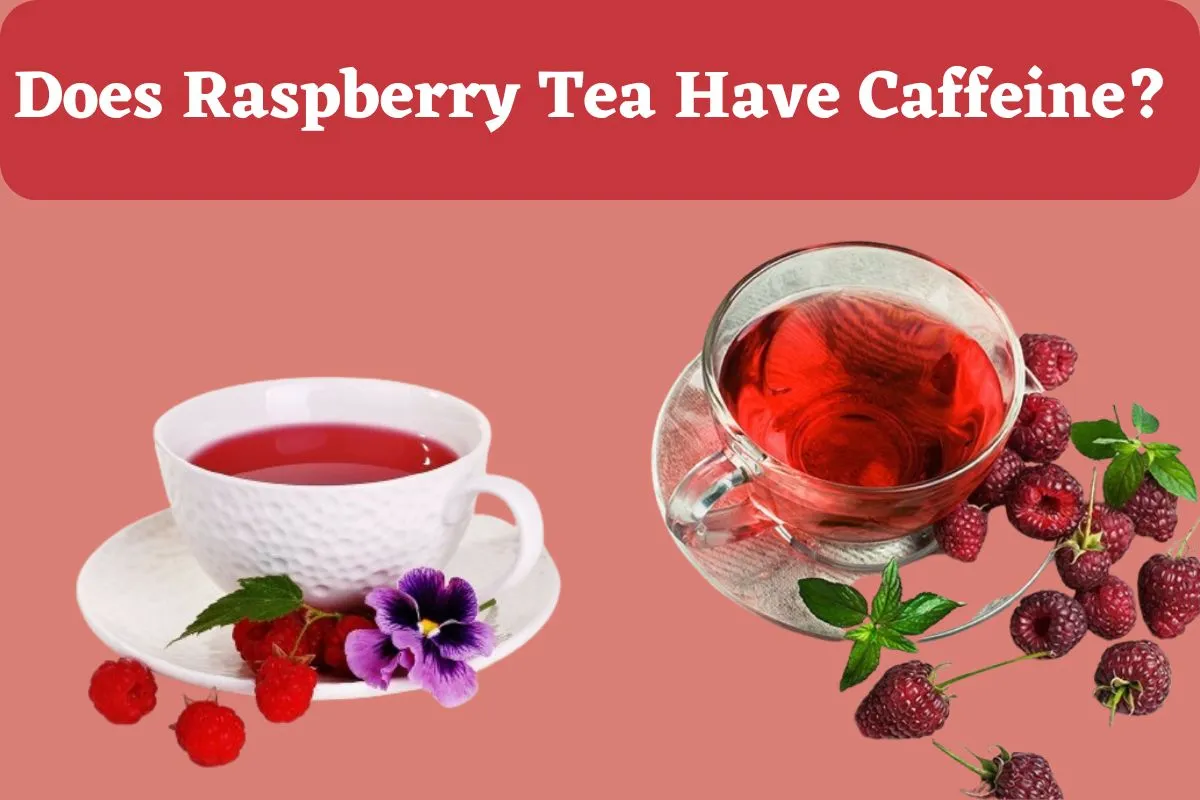For centuries, the delicate leaves of the raspberry plant have been steeped into a comforting herbal tea. Long believed to support women’s health, especially during pregnancy, raspberry leaf tea offers a mild, earthy flavor distinct from the tart sweetness of its berry counterpart.
But if you’re reaching for a cup of raspberry tea, you might be wondering about its caffeine content. Does this ancient herbal remedy offer a gentle pick-me-up, or is a caffeine-free relaxation in store? Let’s explore, Does Raspberry Tea Have Caffeine?
Importance of Knowing Caffeine Content in Raspberry Tea
Raspberry tea, particularly raspberry leaf tea, is consumed worldwide for its range of health benefits, subtle flavor, and nutritional value. Despite its name, raspberry tea can come in different forms, including those made from actual raspberry fruit, raspberry-flavored black teas, and teas made from the leaves of the raspberry plant.
The latter, known as raspberry leaf tea, is especially noted for its medicinal properties. It has been traditionally used to ease menstrual cramps, potentially prevent premature births, and may even boost fertility. Some people also believe it can help prevent miscarriages and reduce morning sickness during pregnancy.
Its nutrient-rich composition, including high levels of vitamins B, C, E, magnesium, and potassium, contributes to these benefits, supporting everything from a healthy urinary system to weight loss and even potentially preventing cancer. It’s also thought to reduce muscle soreness and treat constipation.
There are misconceptions about the caffeine content in raspberry products, with some assuming all raspberry teas are caffeine-free. This is not always the case, especially with raspberry-flavored black teas. Factors like the origin of the tea leaves, blend components, brewing time, and serving size can all influence the overall caffeine content in a cup of raspberry tea.
Knowing the caffeine content is especially important for those sensitive to caffeine, individuals on medications that interact with caffeine, and pregnant or breastfeeding women.
It’s essential to check the ingredient list carefully and opt for pure red raspberry leaf tea if looking for a caffeine-free option. Those with specific health conditions or who are pregnant or breastfeeding should always consult their doctor before consuming raspberry leaf tea to ensure it’s safe and appropriate for them.
Does Raspberry Tea Have Caffeine?
No,, raspberry tea is typically caffeine-free. Unlike traditional teas made from tea leaves, which contain caffeine, raspberry tea is brewed from raspberry leaves, which do not naturally contain caffeine. Here’s why:
- Herbal Infusion: Raspberry tea is an herbal infusion made from dried red raspberry leaves, which do not naturally contain caffeine. This makes it a popular choice for those looking for a caffeine-free beverage option.
- Decaffeinated Nature: Raspberry leaf tea is naturally decaffeinated, making it a suitable choice for individuals sensitive to caffeine or looking to avoid it altogether.
Nonetheless, there are a few considerations to take into account:
- Label-Reading is Essential: The only way to be sure of a raspberry tea’s caffeine content is to carefully examine the ingredients list. Look out for terms like “black tea”, “green tea”, or any other tea type derived from the Camellia sinensis plant.
- “Raspberry Flavored” Isn’t a Guarantee: Some teas may be labeled as “raspberry flavored” without actually containing red raspberry leaves. These are more likely to include a traditional tea base (and thus include caffeine), with raspberry as an added flavoring.
- Brew Time Impacts Caffeine: The longer you steep any tea containing caffeine (black, green, or certain blends), the more caffeine will be released into your cup. For a weaker cup, reduce the steeping time.
By being mindful of these considerations and checking labels, you can enjoy the naturally caffeine-free benefits of raspberry tea without any surprises.
Raspberry Tea Variants and their Caffeine Content
Raspberry tea, while delicious on its own, can be enjoyed in a variety of ways by incorporating different fruits, herbs, and spices. Here are some popular variants:
Raspberry Black Tea:
Raspberry black tea typically contains caffeine due to the black tea base. The caffeine content in black tea can range from 60 to 90 mg per serving. It offers a rich and robust flavor with the fruity essence of raspberry combined with the boldness of black tea.
Raspberry Green Tea:
Raspberry green tea usually contains lower caffeine levels compared to black tea, ranging from 35 to 70 mg per serving. Green tea is known for its milder taste and health benefits, combined with the refreshing notes of raspberry, making it a popular choice for those seeking a lighter caffeine option.
Raspberry Rosehip Tea:
Raspberry rosehip tea is caffeine-free, making it a suitable choice for those looking to avoid caffeine altogether. Rosehip tea is known for its high vitamin C content and combined with the fruity sweetness of raspberry, it offers a delightful and nutritious beverage option.
Raspberry Hibiscus Tea:
Raspberry hibiscus tea is also caffeine-free, providing a floral and tangy flavor profile. Hibiscus tea is rich in antioxidants and when paired with the sweet and tart notes of raspberry, it creates a vibrant and refreshing drink without any caffeine content.
Raspberry Lemon Tea:
Raspberry lemon tea is typically caffeine-free, offering a zesty and fruity combination of raspberry and lemon flavors. This blend provides a citrusy twist to the sweetness of raspberry, making it a popular choice for a caffeine-free, refreshing beverage option.
Raspberry Mint Tea:
Raspberry mint tea is caffeine-free and combines the cooling freshness of mint with the fruity sweetness of raspberry. This blend offers a soothing and invigorating drink, perfect for relaxation and enjoyment without the stimulation of caffeine.
Spiced Raspberry Tea:
Spiced raspberry tea may contain caffeine depending on the base tea used in the blend. The addition of spices like cinnamon, cloves, or ginger to raspberry tea can create a warm and aromatic beverage with varying caffeine levels based on the tea blend used.
Fruit Blends with Raspberry:
Raspberry is often combined with various fruits like strawberry, blueberry, or peach in tea blends. The caffeine content in these fruit blends with raspberry can vary depending on the tea base and additional ingredients. These blends offer a diverse range of flavors, from sweet and tangy to tropical, catering to different taste preferences and caffeine sensitivities.
List of Ingredients in Raspberry Tea
Here are the ingredients you might find in various raspberry tea blends:
- Raspberry Leaves: The primary ingredient in raspberry tea is raspberry leaves, which impart the tea with its distinctive flavor and aroma.
- Water: Water serves as the base for brewing raspberry tea, allowing the flavors of the raspberry leaves to infuse into the liquid.
- Sweeteners (Optional): Some raspberry tea varieties may include sweeteners such as sugar, honey, or stevia to enhance sweetness and balance the tartness of the raspberry flavor.
- Flavor Enhancers (Optional): Certain raspberry tea blends may contain additional flavor enhancers such as natural fruit flavors, herbs, or spices to complement the raspberry taste or add complexity to the tea profile.
- Citrus Zest (Optional): Some raspberry tea recipes may incorporate citrus zest, such as lemon or orange peel, to brighten the flavor and add a refreshing twist to the tea.
- Natural Preservatives (Optional): Commercially packaged raspberry teas may contain natural preservatives to prolong shelf life and maintain freshness.
- Other Herbs or Botanicals (Optional): Depending on the recipe or blend, raspberry tea may include other herbs or botanicals for added flavor, aroma, or potential health benefits. Common additions may include hibiscus, rosehip, or mint.
Raspberry Tea Nutritional Information

A 12-ounce serving of raspberry tea will typically contain about 160 calories. It contains no fat and minimal sodium. You’ll find about 41 grams of total carbohydrates in one serving, with a significant portion (38 grams) coming from sugars, including added sugars.
This translates to about 76% of your daily value for sugars. The tea provides a negligible amount of protein and around 140 milligrams of potassium, which contributes to roughly 3% of your daily recommended potassium intake.
| Nutrient | Amount Per Serving |
| Serving Size | 12 fl oz |
| Calories | 160 |
| Total Fat | 0g (0% DV) |
| Sodium | 10mg (0% DV) |
| Total Carbohydrates | 41g (15% DV) |
| Sugars(Includes Added Sugars) | 38g (76% DV) |
| Protein | 0g |
| Potassium | 140mg (3% DV) |
Read Also:
Alternatives to Raspberry Tea and their Caffeine Content
Here are some alternatives to raspberry tea along with their caffeine content:
Hibiscus Tea:
Offers a similar tart, cranberry-like flavor profile to raspberry tea with a vibrant red hue. It’s naturally caffeine-free and rich in antioxidants. Hibiscus can be enjoyed as a refreshing iced tea or a warming winter beverage with a touch of honey.
Rosehip Tea:
A delicately sweet and floral tea with hints of citrus. Rosehip is a great source of vitamin C and, like raspberry leaf tea, has some traditional uses related to women’s health. Naturally caffeine-free, its subtle sweetness and slightly tangy flavor make it a wonderful afternoon or evening tea.
Fruit Infusions:
Get creative and make your own blends using a variety of dried fruits! Strawberries, apples, mango, pineapple, and even blueberries offer delightful sweetness and refreshing tea experiences. Adding herbs like mint, lemon balm, or even a touch of ginger can introduce extra layers of flavor. Your fruit infusion options are endless and always caffeine-free!
Strawberry Black Tea:
Combines the sweetness of strawberries with the robust flavor of black tea, creating a delicious and caffeinated alternative to raspberry black tea. Experiment with different black tea types for varied flavor profiles.
Peach Green Tea:
The juicy sweetness of peaches pairs beautifully with the grassy notes of green tea. Provides a gentler caffeine boost compared to a peach black tea blend. Look for Japanese green teas like Sencha for an extra layer of complexity!
Citrus-Infused Tea:
Oranges, lemons, limes, and even grapefruit can be added to both black and green teas for a bright, zesty twist. The caffeine content will depend on the base tea used, so you can customize your level of alertness.
Herbal Blends:
Explore the vast world of caffeine-free herbal teas featuring various fruits, spices, and botanicals! Look for blends incorporating chamomile, lavender, or other calming ingredients for a relaxing tea experience.
Rooibos Tea:
This naturally sweet, caffeine-free South African tea is often blended with fruits and other flavors, offering an interesting alternative. Rooibos has a unique honey-like flavor profile that makes it a versatile base for many delicious combinations.
| Alternative | Caffeine Content |
| Hibiscus Tea | Caffeine-free |
| Rosehip Tea | Caffeine-free |
| Fruit Infusions | Caffeine-free |
| Strawberry Black Tea | Moderate |
| Peach Green Tea | Moderate |
| Citrus-Infused Tea | Variable |
| Herbal Blends | Caffeine-free |
| Rooibos Tea | Caffeine-free |
Read Also:
Conclusion
The question of Does Raspberry Tea Have Caffeine? It doesn’t have a simple yes or no answer. Pure red raspberry leaf tea, made solely from the leaves of the raspberry plant, is naturally caffeine-free. However, many popular raspberry-flavored teas blend in black tea, green tea, or other caffeinated varieties.
To be sure if your raspberry tea has a caffeine kick, always check the ingredients list! Whether you’re looking for a gentle, caffeine-free herbal experience or an invigorating raspberry-infused black tea, there’s an option out there to delight your taste buds and suit your needs.
FAQs
Q1. Is raspberry tea safe during pregnancy?
While red raspberry leaf tea has a long history of use during pregnancy, it’s essential to consult your doctor before consuming it. There isn’t enough conclusive scientific evidence regarding its safety and effects, especially in the early stages of pregnancy.
Q2. Can raspberry tea help induce labor?
Research is inconclusive. Some limited studies suggest it may help tone uterine muscles in late pregnancy, but more evidence is needed to confirm a connection to inducing labor. Always discuss the risks and potential benefits with your healthcare provider.
Q3. Does raspberry tea have any other health benefits?
Traditional uses include easing menstrual cramps, reducing nausea, and promoting milk flow. However, scientific evidence for some of these benefits is limited. Red raspberry leaf tea is a good source of vitamins and minerals and may have antioxidant properties, but further research is needed to fully understand its potential benefits.
Q4. How do I make raspberry leaf tea?
It’s simple! Use about 1 tablespoon of dried raspberry leaves per cup of hot water. Allow the tea to steep for 5-10 minutes and strain before enjoying. You can find raspberry leaf tea in tea bags or as loose-leaf tea.
Q5. Can I drink raspberry tea every day?
Moderation is key. While generally considered safe, excessive consumption of red raspberry leaf tea might have some side effects for certain individuals. It’s best to consult your doctor, especially if you take medication or have any health conditions.

Rossi Glover, the passionate Owner of Grand Lake Coffee, infuses every cup with her love for coffee and dedication to quality. With an extensive background in the art and science of coffee, Rossi is not just a connoisseur but a storyteller, sharing the intricate tales behind each brew.

